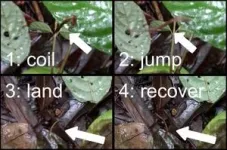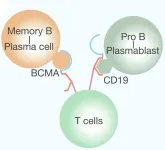Early detection crucial in bile duct cancer for patients with rare liver disease
2024-06-20
(Press-News.org) Primary sclerosing cholangitis (PSC) is a rare progressive liver disease that damages bile ducts and significantly increases the risk of bile duct cancer, particularly a type called cholangiocarcinoma (CCA). This cancer is aggressive, and curative surgery is uncommon. Liver transplantation is a potential treatment option for some PSC-CCA patients, especially if the cancer is caught early. Early diagnosis is essential for successful treatment.
PSC can affect people of all ages but primarily strikes men in their 30s and 40s. It is often accompanied by inflammatory bowel disease (IBD). The disease can progress to liver failure and increase the risk of colorectal cancer as well. There is no cure for PSC, but medications can help manage symptoms.
Diagnosing CCA in PSC patients is difficult due to limitations in diagnostic tools and the non-specific symptoms, which often appear late and mimic those of progressive PSC itself. Magnetic resonance imaging with magnetic resonance cholangiopancreatography (MRI/MRCP) is the best imaging modality for suspected PSC-CCA.
For a select group of patients with PSC-CCA, liver transplantation has emerged as a potentially curative treatment, particularly for a specific type of bile duct cancer called perihilar CCA (pCCA). However, most patients are diagnosed at an advanced stage when curative options are no longer available.
Due to the challenges in diagnosing CCA early, a low threshold for suspicion is recommended in high-risk PSC patients. Regular high-quality MRI/MRCP scans are crucial for early detection.
Researchers are actively seeking better strategies for early detection of CCA in PSC patients. Developing more advanced surveillance techniques and diagnostic tests is a high priority.
PSC is a severe liver disease that significantly increases the risk of bile duct cancer. Early detection of CCA is essential for successful treatment with liver transplantation. More research is needed to improve early detection methods and expand treatment options for PSC patients.
See the article:
Villard C, Jorns C, Bergquist A. Treatment of cholangiocarcinoma in patients with primary sclerosing cholangitis: a comprehensive review. eGastroenterology 2024;2:e100045. doi:10.1136/egastro-2023-100045
About eGastroenterology
eGastroenterology is a new, open-access, and open peer-reviewed BMJ Journal, which focuses on basic, clinical, translational, and evidence-based medicine research in all areas of gastroenterology (including hepatology, pancreatology, esophagology, and gastrointestinal surgery).
For more information, please visit: egastroenterology.bmj.com and follow us on Twitter (@eGastro_BMJ).
Sign-up to Email Alerts for eGastroenterology: https://emails.bmj.com/k/Bmj/jausu/egastroenterology
END
ELSE PRESS RELEASES FROM THIS DATE:
2024-06-20
This study is led by Professor Junnian Zheng and Ming Shi from the Cancer Institute of Xuzhou Medical University, together with the team of Professor Guiyun Cui and Wei Zhang from the Affiliated Hospital of Xuzhou Medical University. The team reported for the first time using BCMA-CD19 bispecific CAR T cells for treating relapsed/refractory CIDP.
Chronic Inflammatory Demyelinating Polyneuropathy (CIDP) is an uncommon condition with sudden onset symptoms, including nerve damage affecting movement, sensation, speech, breathing, and heart rate. ...
2024-06-20
Advances in organoids and embryonic models of human development have the potential to prompt social and existential questions—e.g., what defines human individuality? However, bioethicist Insoo Hyun of Harvard Medical School and the Museum of Science in Boston says that these models have the potential to strengthen rather than weaken the concept of human individuality when considered within the philosophical frameworks of “personhood” and sentience. In a commentary publishing June 20 in the journal Cell, Hyun argues that despite huge advances, we are a long way off from developing technologies that would ...
2024-06-20
Last year on a Friday evening, chemical biology researcher Josh Smalley was in the lab when he received a call inviting him to appear on the 14th and latest season of The Great British Bake Off. Starting as one of a group of 12 amateur bakers, Smalley made it all the way to the final round, where the top 3 contestants compete for the winning spot. In an essay published in the journal Cell Chemical Biology on June 20, Smalley describes the overlap between chemistry and baking and how his training in one ...
2024-06-20
Scientists have discovered a new cause of why people who lack a specific blood group are genetically predisposed to be overweight or obese.
A team of international researchers, led by the University of Exeter, discovered that people with a genetic variant that disables the SMIM1 gene have higher body weight because they expend less energy when at rest.
SMIM1 was only identified 10 years ago, whilst searching for the gene encoding a specific blood group, known as Vel. One in 5,000 people lack both copies of the gene, making them Vel-negative. The findings from the new research suggest that this group is also more likely to be overweight, a conclusion ...
2024-06-20
The discovery of a new, ancient, predatory reptile dubbed Parvosuchus aurelioi — part of a group of crocodile-like reptiles called pseudosuchians — in Brazil is described in a paper in Scientific Reports. The specimen, which dates to approximately 237 million years ago, during the Middle-Late Triassic, is the first small predatory reptile of its kind to be found in this country.
Prior to the dominance of the dinosaurs, pseudosuchians were a common form of ancient quadruped reptile during the Triassic Period (252 – 201 million years ago), with some species amongst ...
2024-06-20
About The Study: The findings of this study suggest that increased maternal mental health symptoms during the COVID-19 pandemic are associated with subsequent changes in regional brain growth in newborn offspring.
Corresponding Author: To contact the corresponding author, Nickie Andescavage, M.D., email nniforat@childrensnational.org.
To access the embargoed study: Visit our For The Media website at this link https://media.jamanetwork.com/
(doi:10.1001/jamanetworkopen.2024.17924)
Editor’s Note: Please see the article for additional information, including ...
2024-06-20
About The Study: In this case-control study of Chinese older adults, adhering to a healthy lifestyle appears to be important even at late ages, suggesting that constructing strategic plans to improve lifestyle behaviors among all older adults may play a key role in promoting healthy aging and longevity.
Corresponding Authors: To contact the corresponding authors, email Xiang Gao, M.D., Ph.D. (xiang_gao@fudan.edu.cn) and Xiaoming Shi, M.D., Ph.D. (shixm@chinacdc.cn).
To access the embargoed study: Visit our For The Media website at this link https://media.jamanetwork.com/
(doi:10.1001/jamanetworkopen.2024.17931)
Editor’s Note: Please see ...
2024-06-20
A team of international researchers has revealed a new, simple clinical test to detect Calcium Release Deficiency Syndrome (CRDS), a life-threatening genetic arrhythmia that causes dangerously fast heartbeats and can lead to severe complications such as sudden cardiac arrest and death.
The new diagnostic method monitors for changes in electrocardiography (ECG) after a brief period of a fast heartbeat and a pause, which can occur naturally or be induced by artificially pacing the heart.
This research was co-led by Jason Roberts, a scientist at the Population ...
2024-06-20
New Haven, Conn. — Patients with pancreatic cancer who received chemotherapy both before and after surgery experienced longer survival rates than would be expected from surgery followed by chemotherapy, according to a new study from researchers at Yale Cancer Center (YCC) and Yale School of Medicine.
The study, published June 20 in JAMA Oncology, included patients with pancreatic ductal adenocarcinoma (PDAC), which accounts for 90% of pancreatic cancers. An aggressive cancer with a high mortality rate, PDAC is predicted ...
2024-06-20
A new study presents video evidence that at least one species of terrestrial leech can jump, behavior that scientists have debated for more than a century. Researchers from the American Museum of Natural History, Fordham University, and City University of New York (CUNY)’s Medgar Evers College published the footage and corresponding analysis today in the journal Biotropica.
“We believe this is the first convincing evidence that leeches can jump and do so with visible energy expenditure,” said lead author Mai Fahmy, a visiting scientist at the Museum and a postdoctoral researcher ...
LAST 30 PRESS RELEASES:
[Press-News.org] Early detection crucial in bile duct cancer for patients with rare liver disease





